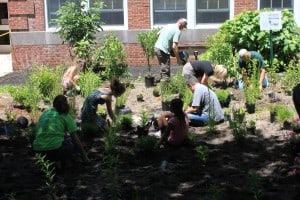
When the bell rang on the last day of school at Elizabeth Haddon Elementary School, while most kids ran squealing away for summer break, a group of fifth grade Girl Scouts Troop 30172 stayed behind to plant a large rain garden in front of the school. The project was the culmination of months of work by the girls learning about water quality, how storm water causes pollutant and sediment runoff, and how rain gardens can capture and infiltrate contaminants that would otherwise end up in the watershed.
The rain garden is located in a particularly problematic area of the school. A very large amount of storm water discharges from a single downspout at a velocity that prevents any vegetation from growing, resulting in soil, sand and water being carried across the grounds and into the street. In the winter, water would freeze across the sidewalk creating a slipping hazard for students. The new rain garden is designed to capture and infiltrate that rainwater and control any overflow safely under the sidewalk. A sign posted at the location explains the function and benefits of the rain garden, and provides an outdoor learning area for years to come.
Camden County Soil Conservation District and Rutgers Cooperative Extension Water Resources Program using a Non-Point Source Pollution Control grant from the New Jersey Department of Environmental Protection funded design and construction of the project. The CCSCD, RWR, and Girl Scouts collaborated with Sustainable Haddonfield, the School District, and the Borough to complete the project. “This is exactly the kind of community effort that makes these projects so rewarding and ultimately successful.” says Julie Beddingfield, co-chair of Sustainable Haddonfield. “The Borough Department of Public Works loaned a backhoe, the School District Buildings and Grounds crew brought in mulch and removed soil and a dying tree, CCSCD and RWR did the design and construction, students and scouts conducted education and outreach, and we all win with much-needed modern storm water management infrastructure.”
The rain gardens are part of an ongoing effort to improve storm water management in the Cooper River watershed by creating innovative demonstration projects to showcase the effectiveness of such green infrastructure and promote techniques that could be copied throughout the watershed. These projects are contributing to the many efforts of Sustainable Haddonfield to promote sustainability in the Borough.









